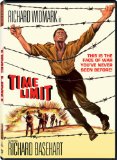| Reviews & Columns |
|
Reviews DVD TV on DVD Blu-ray 4K UHD International DVDs In Theaters Reviews by Studio Video Games Features Collector Series DVDs Easter Egg Database Interviews DVD Talk Radio Feature Articles Columns Anime Talk DVD Savant Horror DVDs The M.O.D. Squad Art House HD Talk Silent DVD
|
DVD Talk Forum |
|
|
| Resources |
|
DVD Price Search Customer Service #'s RCE Info Links |
|
Columns
|
|
|
Time Limit
Fox has released 1957's Time Limit, a tense, emotionally complicated Korean War courtroom drama originally released through United Artists, and starring Richard Widmark, Richard Basehart, Martin Balsam and Rip Torn, with Oscar-winning actor Karl Malden at the helm for his only directorial effort. Adapted (by Denker) from the critically-acclaimed Broadway play written by Henry Denker and Ralph Berkey, Time Limit's seemingly even-handed exploration of the psychological effects of torture on men at war certainly is timely at the moment, but Fox drops the ball with this really strange release that features no menus whatsoever, and a non-anamorphic letterboxed transfer featuring a warning that the film has been formatted to fit the screen.
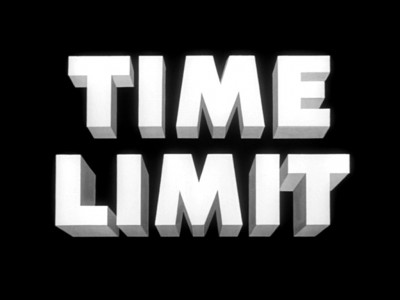
In 1954, Army Colonel William Edwards (Richard Widmark), an investigative lawyer stationed on New York's Governor's Island, is getting bogged down in his case load by the tricky Cargill investigation. Artillery Major Harry Cargill (Richard Basehart) stands accused of treason for collaborating with his North Korean captors at POW Camp Gee Gee during the "police conflict." As everyone points out, including Edwards' mouthy adjutant, Sergeant Baker (Martin Balsam), the Cargill case is a slam-dunk: the evidence supporting his guilt is overwhelming. Cargill lectured the troops on Communist doctrine; he personally signed a pamphlet falsely stating the U.S. utilized germ warfare in the conflict; and he made damning radio broadcasts alleging U.S. war crimes, and in the process, provided aid and comfort to the enemy - all treasonous acts that Cargill readily admits to, and for which he won't refute.
Edwards' immediately superior, Lieutenant General Connors (Carl Benton Reid), whose son died at Camp Gee Gee right before Cargill turned, can't understand why Edwards is taking so long with this case; he's putting increased pressure on Edwards to wrap things up. But after Edwards interviews his last witness, Lieutenant George Miller (Rip Torn), the various eyewitness accounts he's collected somehow don't add up; something isn't kosher with all the staged replies from the survivors of Camp Gee Gee. Add that unsettling fact with the realization that Cargill not only refuses to defend himself but seems eager to hang, and Edwards finds himself torn between the obligations of his job, and his compassionate desire to unravel this mystery and discover why Cargill seems hell-bent on self-destruction.
SPOILERS ALERT!
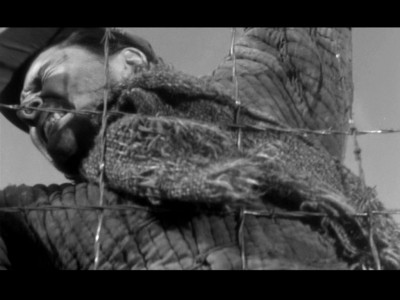
It would be impossible to discuss Time Limit without divulging the surprise twist ending, so if the above description sounds to your liking, I recommend NOT reading any further, and skipping down to the A/V section.
Surprisingly even-handed - up to a point - in exploring what makes a coward or a hero from one day to the next, how we perpetuate and perceive such monikers, and the direct influence of torture on the military code of conduct, Time Limit doesn't waste any time "opening up" the play on which it was based, instead focusing almost exclusively on a series of interrogation encounters at Edward's grimy little office on Governor's Island. These increasingly tense scenes, well-tempoed by director Malden, don't make for the most visually exciting film - a deliberate style choice that Malden felt (according to his autobiography) concentrated the audience's attention on the performances and the dialogue. Malden admits in his book that camera placement was his biggest drawback as a director, and that's obvious from the rigorous 1-2-3, stripped-down TV movie, over-the-shoulder/close-up/master schematic he relies on here. Another director may have been able to create a claustrophobic mise-en-scene to further heighten the suspense - something Malden and his team can't pull-off until the visually startling flashback sequence in the North Korean prison camp. Prior to The Manchurian Candidate, Frankenheimer must have seen this film (he even re-used Khigh Dhiegh, who appears here as Colonel Kim); Malden's stark prison camp sequences are quite remarkable, particularly the horrific strangulation scene, with stoolie Connors squealing like a pig as Miller goes in for the kill.
Malden's and screenwriter/author Henry Denker's strict focus on the themes and relationships in the script, to the detriment of the film's visual schematic, isn't without problems, either. In an admirable effort to be even-handed, oftentimes we're not quite sure where the film stands on the various touchy and complex subjects it brings up. The mystery itself is quite effectively handled; we're in the dark concerning Cargill's motivation for self-destruction until the finale reveals the horrifying no-win situation in which he found himself. Cargill's position on men cracking under torture is clear: he laments how science simply calls granite liquefied under pressure a "phenomenon," while the delicate human brain subjected to equal amounts of emotional and physical stress can result in a label of "coward" if that human breaks and violates the military code. And certainly Edwards' character is clearly drawn as a sympathetic litigator who wants to forgive everyone involved in this ghastly situation.
But other areas of Time Limit can be downright fuzzy as to their ultimate intent. When Edwards goes to interview Cargill's long-suffering wife, played quietly and forcefully by Lassie's June Lockhart (her admission that Cargill "hasn't been to bed" with her for months must have been fairly shocking dialogue back then), she laments the treatment of her sensitive husband who didn't think people should belong to "one country, one religion, but to the human race." Widmark immediately offers that Cargill sounds like he may have been susceptible to a "cause," and a wrong one, at that, to which she responds, "Is that what they've done? Have they twisted our thinking so that a man has to be ashamed of a decent instinct?" Who, exactly though, is "they" here? Communists? Americans? McCarthyites? We don't know. It's a good speech, one countered sensibly by Widmark who says, "It's an old trick, hiding an ugly reality behind a beautiful phrase" (such as, perhaps, "Hope and Change"?), but the film is so cagey and cautious about not delving into its own politics that we have to guess where it's getting its bearings from scene to scene.
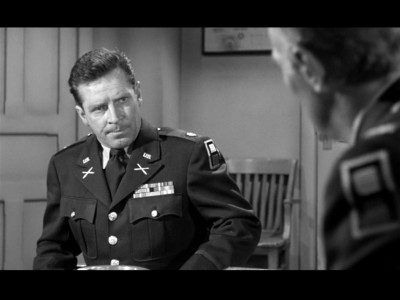
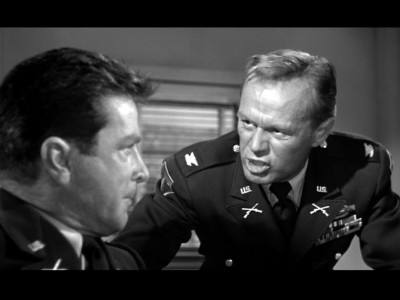
Time Limit is careful to show both sides of a seemingly impossible situation. When it's revealed that Cargill's collaboration was a result of the direct threat of death to all 16 men remaining in the camp, and that Cargill couldn't tell anyone this without incriminating those men in the murder (by Lt. Miller, via lots drawn among all the men) of Lt. General Connors' stool pigeon son (who ratted out the commanding officer who was going to escape, shot dead as a result of Connor's singing), we understand the terrible burden put on Cargill in that hopeless situation. However, the film doesn't let Cargill totally off the hook, with both Edwards and General Connors (who renounces his son's actions despite his sorrow at losing him) declaring that Cargill's judgment, however well intentioned, was flat-out wrong. Earlier, Edwards openly acknowledges that traitors did indeed switch over to the Communist side for "personal gain and physical comfort" (a frank assessment that will go down bad with the politically squeamish appeasers today who recognize no moral absolutes), one of the few times in the film where we get a bead on Edwards' feelings towards men like Cargill (or at least, until Cargill is "cleared," so to speak). Certainly Lt. Gen. Connors's reply to Edwards' pleas for the General not to think badly of his son is a sobering tonic to the "feel good" pleas of blubbering Cargill. Cargill invokes the metaphor of a "time limit" for heroes in the Army, telling the General that his son was a hero for 100 days before he broke for just one, and that he should therefore be excused of any blame or judgment. Sensibly, the General counters this too-kind thinking by pointing out the obvious: his son's "break" caused the death of another man; there can be no excuse for one's own personal weakness if another man dies as a result of it.
And by extension, Cargill's pleas for understanding concerning his own actions are met with sympathy by the General for Cargill the sensitive man, but no sympathy and no leniency for Cargill the soldier because he broke the military code of conduct. He points out to the crying Cargill that all military leaders, from sergeants in charge of small platoons, to generals like himself, have the terrible responsibility of putting men's lives in danger for the greater good of the cause. Cargill's worries about 16 men's wives and children pale in comparison to the General's responsibility in wartime for the cries of thousands of men's wives and children. The General deftly counters Edwards' and Cargill's pleas for mitigating circumstances by acknowledging such circumstances exist, but that those factors can not alter the strict implementation of the code because, as he puts it, "until a better world is built, it's got to be done. That is why we have the code. The code is our Bible, and thank God for it." In other words, "empathy" can't factor into legal matters involving the military code or indeed any law because we then transform ourselves from a nation of laws, to a nation of men...with all the perfidiousness and vagaries that inevitably will result from "empathetic" rule of law (does any of this sound familiar right now, folks?).
The General's gentle yet unyielding rebuke of Edwards' and Cargill's entreaties isn't allowed to stand, with Time Limit stacking the deck in favor of forgiving Cargill's crimes with Edwards not recommending a court martial, as well as his offer to defend Cargill at the court martial that will still, inevitably, come. Had the film shown the aftereffects of Cargill's crimes in any broader context than a strictly a personal one (Cargill's anguish over feeling like a coward and traitor, and his inability to re-connect with his wife); had his collaboration resulted in harsher treatment for the soldiers, or more deaths (as continued collaboration often did in such cases); or had the effects of Cargill's propaganda efforts subsequently boosting moral and offering aid and comfort to the enemy been illustrated in even the slightest way, the audience might not have left the theaters feeling so forgiving and self-satisfied that all's well with the situation, now that at least one person understands him: Edwards. The film lets Edwards say Cargill's decision to collaborate was wrong - something Cargill also admits - but then sweeps away any responsibility by saying everything is okay as long as we all understand we're all human and we all make mistakes...without showing the direct effects of Cargill's mistake. Basehart, an actor I've always enjoyed, doesn't help matters here by enacting Cargill alternately as a smug smartass (his long, drawn-out "Yeeeess" answers to Widmark are remarkably bad) or a blubbering wreck, perversely proud of his weakness. Had a different actor brought equal measures of a heroic quality with an almost Greek-like sense of tragedy to the character, the film might not have wound up feeling so pat at the end, so secure in its ultimate vindication of the Cargill character.
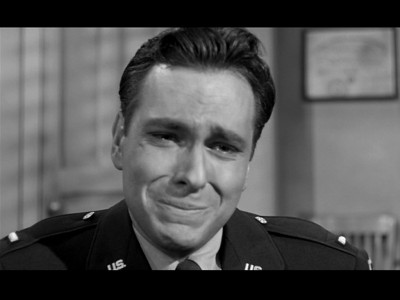
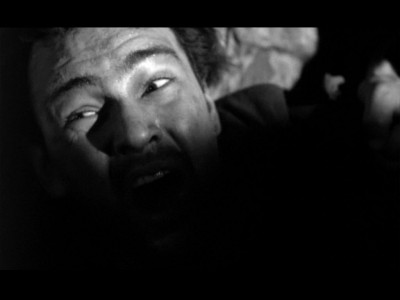
The DVDs:
The Video:
I'm not aware of any previous release of Time Limit from MGM, but this transfer doesn't look new, with a spurious warning about the film being formatted to fit your screen included at the start of the menu-less DVD (that's right, no menu: the thing just starts up, with chapter stops every 10 minutes). The non-anamorphic, 1.68:1 letterboxed image looks absolutely fine on the smallest tube monitor you have, but once you fit it to your large monitor, the picture suffers accordingly. The print used looks quite clean, with almost no damage or scratches. On my (dying) last tube monitor, the gray scale was appropriately balanced, and the picture relatively sharp. But on my biggest HD monitor, the picture tends towards soft and relatively washed out. Non-anamorphic letterboxed transfers are really becoming bothersome at this point in the game - particularly from a big studio like Fox. Get your asses in gear, fellas!
The Audio:
The big, fat English 1.0 mono audio track accurately represents this small, small-budgeted film's original soundtrack. All the dialogue is crisp and clean, and close-captions are available (although again, you'd have to guess at that, since there are no menus.
The Extras:
Who knows if there are extras hidden on this disc...since there aren't any menus?
Final Thoughts:
Thoughtful, somewhat even-handed, and compellingly performed by Richard Widmark and Rip Torn (Richard Basehart...not so much), Time Limit is a worthwhile addition to the courtroom drama subgenre. Director Karl Malden isn't much of a stylist, but he does stage one or two arresting scenes in a North Korean prison, while keeping the narrative moving along at a fast pace. This transfer, though, is lacking. Still, Time Limit is interesting enough (and timely at this moment in history) to warrant a recommended rating.
Paul Mavis is an internationally published film and television historian, a member of the Online Film Critics Society, and the author of The Espionage Filmography.


|
| Popular Reviews |
| Sponsored Links |
|
|
| Sponsored Links |
|
|
| Release List | Reviews | Shop | Newsletter | Forum | DVD Giveaways | Blu-Ray | Advertise |
|
Copyright 2024 DVDTalk.com All Rights Reserved. Legal Info, Privacy Policy, Terms of Use,
Manage Preferences,
Your Privacy Choices | |||||||









